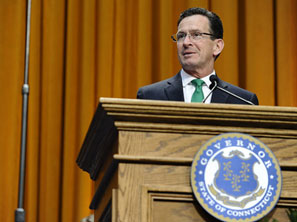
Hand it to the members of Connecticut’s Sandy Hook Advisory Commission: they won’t admit that they had it wrong. Instead of retracting the false claim that homeschooling had something to do with Adam Lanza’s heinous crime in December 2012, in which he gunned down 26 people, including 20 children, at a Newtown elementary school, the 16-member panel continues to flail around in search of a connection. At its most recent meeting, Governor Dannel Malloy’s hand-picked commission sought new ways to prevent Connecticut parents from educating their children as they see fit. But as commission member Dr. Harold I. Schwartz himself admits, the commission’s latest draft recommendation “is not perfectly thought out.”
The Sandy Hook Advisory Commission caused a stir last year by claiming that local school officials and mental health professionals couldn’t help Lanza with his severe mental and emotional issues because he was being homeschooled by his mother. Had this not been the case, the commission implied, then the system might have prevented the December 2012 tragedy from occurring. “The facts leading up to this incident support the notion [that there is a] risk in not addressing the social and emotional learning needs of [homeschooled] children,” said Schwartz in September. To ensure that the next homeschooled mass murderer doesn’t fall through the system’s cracks, the commission developed a draft recommendation to give local school officials unprecedented approval power over parents who wish to homeschool children with social, behavioral, and emotional challenges.
An uproar followed. This writer and others blasted the commission for its willingness to restrict the rights of parents to homeschool based on the still-murky implications of one dramatic case. Then new evidence came to light proving that Lanza had in fact never been homeschooled. In its report, the state Office of the Child Advocate revealed that rather than being homeschooled, Lanza had in fact been placed on “homebound status” during his early high school years. This meant that the Newtown school district had a legal obligation to continue implementing his “individualized education plan” (IEP) and working toward the academic and behavioral goals it contained. All the evidence suggests that they failed in this obligation, though Lanza and his issues were well-known to local school officials.
Undeterred, the commission presses on. They understand, they say, that they were wrong about Lanza’s educational history. They appreciate the difference between homebound status and homeschooling. They realize that regulating the rights of Connecticut homeschoolers is “well beyond the intended reach of the commission,” in the words of commissioner David J. Schonfeld.
But the commission stands by its previous recommendation that parents who homeschool children with social, emotional, and behavioral issues be required to present those children for inspection to local school officials once a year. And in fact, the commission is adding a new recommendation. It goes like this: let’s say there’s a student enrolled in public school who qualifies for special education services through an IEP. Let’s say that this child’s parents decide to pull the child from the public school and educate him or her in the home. Their reasons for doing this could vary—they could be unhappy with the classroom atmosphere; they could be frustrated with the quality of teaching in the school district; they may have grown tired of the endless paperwork and meetings with school officials that IEPs—which are legal contracts—require; they could have religious or other personal motivations; they might suspect, but not be able to prove, that the school is failing to meet its obligations; or they might simply have determined that they could do a better job of educating their child.
Too bad, says the commission. If your child already has an IEP and you choose to homeschool that child, you will continue to be bound by the requirements of the IEP. “The concern was that if a family is overwhelmed by the child’s disabilities . . . and decides to withdraw the child from social and emotional interaction because they don’t feel that the child can handle it and therefore the family feels they can’t handle it—that is not a solution that is in the best interests of the child, of the family, or of the community,” said Schonfeld. In other words, once you’re in, you’re in, and good luck changing your mind.
What about a child with special needs who is homeschooled from the start? How will school officials identify such children and pull them into the system—which, by the way, so spectacularly failed Adam Lanza? Will parents of such children be forced into accepting an IEP, perhaps against their will? “I think you may have identified a hole or problem in our recommendation because I’m not sure how such a child’s disabilities would be identified,” said Schwartz. Presumably, this is an issue that the commission will now look into, while claiming that it has no desire to tread upon the established rights of Connecticut homeschoolers.
Attorney Deborah G. Stevenson, founder of the Connecticut-based National Home Education Legal Defense, says the commission is “dreadfully ignorant” of existing federal and state law. “Under IDEA, the Individuals with Disabilities in Education Act, which establishes the IEP procedure, parents have the right to consent or to refuse special education services provided by the public school,” she says. The commission’s new recommendations would violate specific provisions of IDEA and Supreme Court jurisprudence in the area of parental rights. “In many cases, including the seminal case of Wisconsin v. Yoder, the Supreme Court has emphasized that a state cannot compel any parent to accept a public school education,” says Stevenson. “It is truly a shame that the commission did not conduct more thorough research before making such an unenforceable recommendation.”
The commission demonstrates the problem with government by “experts,” who too often feel that they must invent problems to solve. Consistently over-interpreting its mandate, the Sandy Hook Advisory Commission maintains, at best, only a tangential connection to its original purpose.